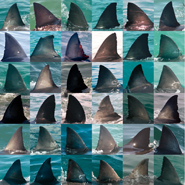Computer scientists from the University of Bristol are collaborating with shark researchers to build an international visual biometrics database of Great White Sharks.
The computer identification system will store images of the White Shark's unique dorsal fin to help international shark groups recognise and track individual species, providing them with a better insight into their behaviour and how to protect them.
Dr Tilo Burghardt from the the University’s Department of Computer Science, who is working on the project in collaboration with international partners, said: “We are developing the software for a system that will be able to automatically recognise features of White Shark dorsal fins using 'computer vision' technology, and then archive the animal information along with their IDs.
“We hope it will be usable within two years, with members of the public able to participate."
Michael Scholl, founder of NGO White Shark Trust, initiated and designed the photographic based fin-printing identification system enabling scientists to identify individual White Sharks over long periods of time with minimal interference with the wild animals. The present White Shark Trust fin-print database includes over 1,500 different White Sharks.
Michael added: “An automated software-based identification system is necessary for building an international centralised database for scientists to be able to collaborate and work together efficiently.”
